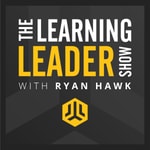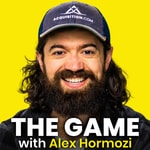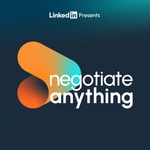The Learning Leader Show With Ryan Hawk – Details, episodes & analysis
Podcast details
Technical and general information from the podcast's RSS feed.

The Learning Leader Show With Ryan Hawk
Ryan Hawk
Frequency: 1 episode/6d. Total Eps: 646

Recent rankings
Latest chart positions across Apple Podcasts and Spotify rankings.
Apple Podcasts
🇨🇦 Canada - management
28/07/2025#41🇺🇸 USA - management
28/07/2025#16🇨🇦 Canada - management
27/07/2025#25🇺🇸 USA - management
27/07/2025#18🇨🇦 Canada - management
26/07/2025#26🇺🇸 USA - management
26/07/2025#19🇨🇦 Canada - management
25/07/2025#29🇬🇧 Great Britain - management
25/07/2025#66🇺🇸 USA - management
25/07/2025#18🇨🇦 Canada - management
24/07/2025#38
Spotify
No recent rankings available
Shared links between episodes and podcasts
Links found in episode descriptions and other podcasts that share them.
See all- https://www.instagram.com/p
11467 shares
- https://www.instagram.com/ryanhawk12
20 shares
- https://twitter.com/LewisHowes
1883 shares
- https://twitter.com/RyanHawk12
597 shares
- https://twitter.com/Jason
588 shares
- https://jamesclear.com/atomic-habits
569 shares
- https://www.garyvaynerchuk.com/
205 shares
- http://www.LearningLeader.com
205 shares
RSS feed quality and score
Technical evaluation of the podcast's RSS feed quality and structure.
See allScore global : 48%
Publication history
Monthly episode publishing history over the past years.
597: Daniel Pink - The Art of Selling, How To Persuade Others, and The Surprising Truth About What Motivates Us
dimanche 25 août 2024 • Duration 59:57
Go to www.LearningLeader.com for full show notes
Read our book, The Score That Matters https://amzn.to/4dNLqoH
The Learning Leader Show With Ryan Hawk
Episode #597 -- Daniel Pink
- How to give a great townhall speech:
- Begin with the end in mind. What do you want the people in the audience to do?
- Prepare, don’t wing it. Be ready. Practice
- Sound like you. Don’t try to sound like Steve Jobs or someone else. When you’re on stage or presenting at work, sound like you. Be genuine.
- Ideas for persuading others:
- Make it easy for others to say yes
- Social proof - Show that others are doing it (this is why companies put the logos of their customers on their website)
- Know when to appeal to the head or the heart. Typically, it’s the heart and emotion when speaking to those who work for you. And it’s your head when speaking to your boss. This is nuanced though and not black and white.
- Remember, there are two types of people: Those who make their boss's life easier or harder. Be the former.
- Pitching... Miles Teller in the TV show The Offer. Instead of trying to convince the mob boss to allow him to make the movie, he offered to show him the script and collaborate with him. The best pitches invite others to be co-creators.
- The motivation framework:
- Autonomy: The desire to direct our own lives. Giving people more control over their work or tasks can enhance motivation and performance.
- Mastery: The urge to get better at something that matters. People are more motivated when they see progress and can develop their skills.
- Purpose: The feeling that what we do is important and has meaning. Connecting tasks or jobs to a larger cause can be a powerful motivator.
- "If you're not confident, don't be self-deprecating."
- To Sell is Human - "We're all in sales... Convincing, cajoling, persuading."
- Make it easy for people to say yes... That's what the best salespeople do.
- Social Cues -- From Robert Cialdini - People look around for cues. That's why companies put logos of their customers on their websites. So others look and say, "Oh, they are with them, I guess we can be too."
- Know when to appeal to the head or heart. "When managing up, it's usually their head. When managing down, it's usually their heart."
- Processing fluency - Make it sticky. Memorable. Rhyme. Repetition. Repetition. Repetition.
596: Arthur Brooks - The Art & Science of Happiness, Defining Your Purpose, Working with Oprah, Living Authentically, and Building The Life You Want
dimanche 18 août 2024 • Duration 01:02:12
Read our book, The Score That Matters https://amzn.to/3XxHi7p
Full show notes at www.LearningLeader.com
Notes:
- Arthur grew up with one goal - To be the world’s greatest French horn player. He learned that striving for something was fungible across all fields of life. It was a great laboratory for learning.
- Intrinsic vs Extrinsic motivation - Intrinsic motivation comes from an internal desire to accomplish a goal, while extrinsic motivation comes from external rewards and praise.
- "Misery comes from excessive auto-focus." Misery comes from thinking about yourself too much and not enough about helping others.
- The curse of the strive... All happiness comes from progress.
- The arrival is not the goal.
- How to be happy while striving:
- Be grateful - Write it down. Do it daily.
- Always look to help others.
- "All research is 'me-search.'"
- The Four Idols:
- Money, Power, Pleasure, and Prestige/Fame. We talked through ours… What are yours?
- The Four Focus areas to help with happiness
- Faith
- Family
- Friendship
- Serving Others
- Define your purpose. Write it down. Understand why you're here. Mine = "To inspire others to value and pursue excellence." Too many people are ok with mediocrity. We should strive for more.
- Oprah Winfrey is the same person everywhere she goes. She is genuine and authentic to all.
- Arthur's column helped Oprah stay positive and happy through the pandemic. So much so that she called him and asked to meet. And eventually, write a book together. That book became a #1 best-seller.
- #1 Life Hack: "Don't lie ever."
- Arthur is jacked (in great shape).
- Taking care of your body helps with unhappiness.
- Wake up 1.5 hours before dawn. Work out hard. Lift weights. Do challenging cardio.
- Life/Career Advice:
- Don't worry too much about the first job out of college. Don't sacrifice relationships.
- Bring love to every relationship and be great at what you do. Be excellent.
- Emanate love and show excellence.
587: Daniel Negreanu - Responding To Failure, Risking It All, Getting Rich, Embracing Criticism, Taking Ownership of Your Life, & How To Read People
dimanche 16 juin 2024 • Duration 01:03:49
Read our new book, The Score That Matters https://amzn.to/3VlZHCA
Full show notes at www.LearningLeader.com
This episode is supported by Insight Global. Insight Global is a staffing company dedicated to empowering people. Please CLICK HERE for premier staffing and talent.
Notes: Daniel Negreanu has earned over 52 million dollars at the poker table, which ranks him as the highest-earning player in live tournament poker history. He’s won 6 world series of poker bracelets, two world poker tour titles, and Daniel was inducted into the Poker Hall of Fame in 2014. He’s often referred to as “Kid Poker” and is known for his charismatic personality at the table.
- Commonalities among the greatest poker players in the world:
- Self-Awareness
- Humility
- In order to avoid criticism, “say nothing, do nothing, be nothing.”
- Daniel is obsessed with the Rocky movies and the lessons learned from each one. Rocky 3 - Don’t get complacent. Rocky 4 - It’s heart versus machine. Rocky Balboa - But it ain't about how hard you hit. It's about how hard you can get hit and keep moving forward. How much you can take and keep moving forward. That's how winning is done!
- The luck factor... Dealing with things outside of our control. A victim versus an owner mentality. Victims will complain, give up, sulk, be passive-aggressive, or procrastinate. Owners will seek solutions, take action, or ask for help. Victims will focus on things they cannot control, while owners will focus on things they can control.
- "A big mistake is a beautiful opportunity." It's easier to be a victim and not take responsibility.
- "Failure builds muscle."
- "I don't care what others think anymore. I do not have that fear."
- Rounders (the movie) is the greatest poker movie of all time.
- Why Daniel is inspired by Sylvester Stallone...
- He's not complacent
- In Rocky IV it was heart versus machine. Rocky (Sly) was all heart.
- Outspoken and direct – “If you have a problem with me, text me. And if you don't have my number then you don't know me well enough to have a problem with me.” – Christian Bale
- Phil Ivey said about Daniel: “I can't think of too many people who have done more for the game of poker than Daniel.”
- When was Daniel happiest? “I would say in very high-stress situations. During the World Series of Poker main event [in 2015], when I actually was eliminated in 11th place and felt a gut punch.”
- Early life – Be Rich – At an early age, Daniel was ambitious: "From the age of four, I thought I'd be rich. I told my mom I'd build a house out of Popsicle sticks and move to California."
- Sharing both the wins and the losses with his fans: “This is what holding yourself accountable looks like. I could lie, right…or B. I could just not share this with you but then that wouldn’t be authentic and real, right? I’m not just going to share my winning years, I’m going to share my losing years."
- Daniel is willing to go outside of his comfort zone... Head's up matches with Doug Polk (a head's up specialist): On July 29, 2020, after a years-long feud, Daniel publicly accepted a challenge to a high-stakes grudge match with Doug Polk. They played 25,000 hands of No-Limit Texas Hold'em at $200/$400 stakes. The duel ended on February 4, 2021, with Polk winning approximately $1,200,000 over 25,000 hands. Then in 2023, Daniel got a rematch with Doug and beat him for $200K and a championship belt.
497: Julian Treasure - How To Speak So That People Will Want To Listen
dimanche 30 octobre 2022 • Duration 01:09:17
Text Hawk to 66866 to become part of Mindful Monday. Receive a carefully curated email from me each Monday morning to help you start your week off right...
Full show notes at www.LearningLeader.com
Twitter/IG: @RyanHawk12 https://twitter.com/RyanHawk12
Julian Treasure is a sound and communication expert. His TED Talk, “How to speak so that people want to listen” is in the top 10 TED talks of all time and collectively, his 5 TED talks have been listened to more than 100 million times! He is also the best-selling author of How to be Heard and Sound Business.
Notes:
- "I was taught this exercise many years ago by a wise old friend named Charlie. I was bemoaning someone being in my way and Charlie put his hand on my arm. “You know, resentment is like drinking poison and expecting the other person to die,” he said. When we’re unconsciously in the habit of judging and blaming others, it can have a huge impact on our well-being."
- You can’t judge and love at the same time. Being judgemental is the opposite of being curious. "Being judgemental comes from ego and from darkness in the soul."
- Julian's values: Write them down. Be clear. They help you make decisions...
- Faith - A decision that all will be well
- Love - Wish people well
- Acceptance - Go with the flow
- Gratitude - Be focused on the half-full bit of the glass
- There are 4 foundations that we can stand on if we want our speech to be powerful and make change in the world
- HAIL - To greet or acclaim enthusiastically
- H - Honesty - Be clear and straight
- A - Authenticity - Be yourself
- I - Integrity - Do what you say. Be your word.
- L - Love - Wish them well. “If you’re really wishing someone well, it’s hard to judge them at the same time.”
- 7 deadly sins of speaking
- Gossip
- Judging
- Negativity
- Complaining
- Excuses
- Exaggeration
- Dogmatism
- Listening is a skill. Hearing is a capability. Listening is making meaning from sound. You can practice it and master it. As leaders, we need to continue working on this skill to ensure the people we’re leading know they are heard and seen. We all can picture that bad boss that looked at their phone while we talked to them. Let's not be that person.
- Listening is making meaning from sound...
496: Donald Miller - Be The Hero, Add Value To Others, & Don't Trust Fate To Write Your Story (LIVE! In Nashville)
dimanche 23 octobre 2022 • Duration 50:09
Text Hawk to 66866 to become part of "Mindful Monday" -- Join 10's of thousands of other Learning Leaders who start their week with a curiosity-inducing email.
Full show notes at www.LearningLeader.com
Twitter/IG: @RyanHawk12 https://twitter.com/RyanHawk12
Donald Miller is the Founder/CEO of Storybrand, a marketing company. He is also the Founder/CEO of Business Made Simple, an online platform that teaches business professionals everything they need to know to grow a business and enhance their personal value on the open market. He is the author of several books including the bestseller "Building a StoryBrand." We recorded this podcast in front of a live audience at my 2022 Growth Summit in Nashville, TN.
- “I don’t think any of us should trust fate to write the story of our lives. Fate is a terrible writer.” – It’s on us to take ownership of our lives and write our own stories.
- The 4 Roles We Play In Life:
- The Victim - The character who feels they have no way out
- The Villian - The character who makes others small
- The Hero - They accept their own agency. They know what they want. They face their challenges and transform.
- The Guide - The character who helps the hero
- How do most value-driven people see themselves? They see themselves as an Economic Product on the Open Market -- (be a good investment to attract further investment) “They are obsessed with getting people a strong return on the investment made in them. People who are obsessed with being a good investment attract further investment and get to enjoy more personal economic value. When you offer greater economic value within the economic ecosystem, you are paid more, given more responsibility and promotions, and are sought after by customers looking for value. In business, your boss may really like you, but in large part, they see you as an economic investment. There is nothing wrong with that. So how do we become ridiculously successful? By making other people absurdly successful.”
- They are relentlessly optimistic - Staying optimistic, you dramatically increase the chances that at some point you will succeed. The more optimistic you are, the more willing you will be willing to try. Successful people fail all the time. The difference is their willingness to keep trying.
- They know the right way to engage in conflict - Conflict-avoidant people are rarely chosen to lead. All human progress happens by passing through conflict.
- They have a bias towards action - “There is one thing every successful person has in common: They have a bias towards action.” They don’t let ideas die on the vine. They take action to make those ideas happen.
- " Fear is a manipulative emotion that can trick us into living a boring life."
495: Julia Boorstin - Interviewing Powerful CEOs, Building Confidence, & Becoming A Talent Magnet (When Women Lead)
dimanche 16 octobre 2022 • Duration 54:17
Text Hawk to 66866 to become part of "Mindful Monday."
Full show notes at www.LearningLeader.com
Twitter/IG @RyanHawk12 https://twitter.com/RyanHawk12
Julia Boorstin is CNBC’s Senior Media & Tech Correspondent. She covers media with a special focus on the intersection of media and technology. In 2013, Julia created and launched the CNBC Disruptor 50, an annual list she oversees, highlighting the private companies transforming the economy and challenging companies in established industries. She’s the author of a new book called, “When Women Lead - What they achieve, why they succeed, how we can learn from them."
- Julia’s parents inspired her to pursue hard things and instilled in her a love of asking questions. As parents, we should do the same.
- Asking questions is a sign of respect and that you care. We should ask more questions than we answer both at work and at home. Approach people with curiosity. It’s how we show that we care.
- Julia found a unique way to add value to her employer: Creating the Disruptor 50 list. It’s important for us to find unique ways to add value to our company and do work that inspires us at the same time. It’s evident that Julia loves it and because of that, both CNBC and Julia win.
- She has taken an entrepreneurial approach to her career at CNBC and has come up with and championed many ideas that have been impactful and built her career. She shares how you can do that too…
- Julia shares her preparation process for interviewing a powerful leader like Sheryl Sandberg or Bob Iger.
- "I didn't have a background in business. I had to over-prepare."
- How to become a talent magnet and attract effective leaders to want to work for you...
- She shares the biggest takeaway that you learned from interviewing thousands of CEOs and executives including Katrina Lake, Gwyneth Paltrow, Whitney Wolfe Herd, Jennifer Hyman, and more.
- Advice Julia got from her dad:
- "The road is always better than the inn." Enjoy the process.
- "The best way out is always through." Don't look for shortcuts.
- "I can't go on, I can't go on, I'll go on." Be persistent.
- How to build confidence?
- Get the reps... Do it a lot. Confidence is built through action.
- Commonalities of excellent leader:
- Humility
- Focus
- High adaptability quotient
- Communal leadership
- Empathy
- "Make your own characteristics a superpower."
- Life/Career advice:
- Be willing to fail
- It's a volume game
- Be prepared for brainstorming meetings. Have a portfolio of ideas.
- Julia's book writing process:
- She interviewed 120 leaders
- What can men do to be supportive?
- "Men need to understand the statistics. Diversity = more value."
- Be a talent magnet. Be honest about what you don't know.
494: Mayor Eric Adams - Authenticity, Honesty, & Changing From Within... A Conversation With The Mayor Of New York City
dimanche 9 octobre 2022 • Duration 33:42
Text Hawk to 66866 to become part of "Mindful Monday."
Full show notes at www.LearningLeader.com
Twitter/IG: @RyanHawk12 https://twitter.com/RyanHawk12
Mayor Eric Adams has served the people of New York City as an NYPD officer, State Senator, Brooklyn Borough President, and now as the 110th Mayor of the City of New York.
Notes:
- When Eric was 15, he was beaten by a police officer.
- “Instead of saying woe is me, I said why not me?” He became a police officer...
- Mentor, Reverend, and Civil Rights Leader, Herbert Daughtry, encouraged him to change the system from within.
- If you have a problem with a system, try to change it from within. Instead of complaining about it, do something about it. Take action.
- A mindset shift: “There is something I’m supposed to learn from this.” – Shifting our minds from blaming and complaining to asking ourselves, “What can I learn from this?”
- Mayor Adams became President of a Black officers association before founding his own group, 100 Blacks in Law Enforcement Who Care.
- The New York Times has called Mayor Adams, “The mayor who never sleeps.” - He's known to be up early working and go out late at night… Including going to clubs like Zero Bond (a private club) and not being afraid to take pictures with fellow New Yorkers while holding a vodka/soda in hand…
- Being perfectly imperfect. Authenticity, being genuine. Mayor Adams goes out to clubs and drinks with his fellow New Yorkers. He doesn’t hide it. So many politicians put up a facade. An image that isn’t real. Part of his appeal is that he’s real, he’s human… We all want that.
- Cleaning up his diet – After 9/11, he relied on comfort food (quarter pounder or a bucket of KFC). One day in 2016, he woke up blind in his left eye and suffered nerve damage in his feed, which could have led to amputation. His diabetes was killing him. He switched to a plant-based diet and lost 35 pounds. (and wrote a book about it)
- “I would rather be a person that is authentic and make mistakes than robotic and be a fake,” Adams says, sitting on the couch in his office. “Folks are tired of just these terrible fake leaders. They’re always trying to live up to someone. Always."
- What does Mayor Adams think about those who use the phrase, "Defund the Police?"
- "They don't get it."
-
- "After protests, you must do something to protect. You cannot simply protest, you have to protect."
- “All I can say, have your haters become your waiters when you sit down at the table of success."
493: Patrick Lencioni - Becoming More Humble, Leading With Curiosity, & Understanding Your Working Genius
dimanche 2 octobre 2022 • Duration 01:05:00
Text Hawk to 66866 to become part of Mindful Monday. Join 10's of thousands of learning leaders from all over the world better understand how you can become a more effective leader. Text Hawk to 66866 for more...
Full show notes at www.LearningLeader.com
Twitter/IG: @RyanHawk12 https://twitter.com/RyanHawk12
My guest: Patrick Lencioni has written 14 books on business management, particularly in relation to team management. He is best known as the author of The Five Dysfunctions of a Team, a popular business fable that explores work team dynamics and offers solutions to help teams perform better. He's also written The Ideal Team Player, The Advantage, The Motive, and his latest book is called The Six Types of Working Genius.
Notes:
- Pat loves The Pat McAfee Show because of their candor, humor, and authenticity.
- "Humility is a virtue. You can practice it."
- "Seek first to understand prior to trying to be understood."
- Be curious. "If we don't understand them, we judge them." The opposite of judgment is curiosity.
- When you're humble, there is no sense of entitlement.
- Good teammates?
- "They take ownership of their mistakes and work to correct them." Must take ownership of it to improve.
- The Ideal Team Player -- Humble, Hungry, Smart.
- The Five Dysfunctions Of A Team:
- Absence of trust - unwilling to be vulnerable within the group
- Fear of conflict - seeking artificial harmony over constructive passionate debate
- Lack of commitment - feigning buy-in for group decisions creates ambiguity throughout the organization
- Avoidance of accountability - ducking the responsibility to call peers on counterproductive behavior which sets low standards
- Inattention to results - focusing on personal success, status, and ego before team success
- The Six Types of Working Genius:
- Wonder – People with this genius can’t help but question whether things could be better in the world around them. They are troubled whenever they see unmet potential, and they are constantly curious and on the lookout for the need to change something.
- Invention – This type of genius is all about creativity. People who have it, love, to generate new ideas and solutions to problems and are even comfortable coming up with something out of nothing.
- Discernment – People with this type of genius have a natural ability when it comes to evaluating or assessing a given idea or situation and providing guidance. They have good instincts, gut feel, and judgment about the subtleties of making decisions that integrate logic, common sense and human needs.
- Galvanizing – This type of genius is about bringing energy and movement to an idea or decision. People who have it like to initiate activity by rallying people to act and inspiring them to get involved.
- Enablement – People with this type of genius are quick to respond to the needs of others by offering their cooperation and assistance with a project, program, or effort. They naturally provide the human assistance that is required in any endeavor, and not on their own terms.
- Tenacity – This type is about ensuring that a given project, program, or effort is taken to completion and achieves the desired result. People who have this genius push for required standards of excellence and live to see the impact of their work.
- Pat’s areas of working genius: “I am naturally good at and drawn to what we call Invention and Discernment, I like to come up with new, original ideas, even when it’s not what’s called for. And I love to use my intuition to evaluate and assess ideas and plans to see what would be best. My areas of frustration are Tenacity and Enablement, meaning I struggle to push projects through to completion after the initial excitement wears off, and I have a hard time providing assistance to others on their terms. That doesn’t mean I can’t do those things, because all of us have to do things we don’t like or aren’t good at sometimes. But if I’m in a situation where people are relying on me as their primary source of enablement and tenacity, that’s not good for me or for them in the long run.”
- Pat is a "discriminating ideator."
- My areas of working genius: Discernment and Tenacity. The assessment says: “You are good at and enjoy using your intuition and instincts to evaluate and assess ideas or plans, and pushing projects and tasks through to completion to ensure that the desired results are achieved.”
- "You are what we call a judicious accomplisher."
492: Scott Galloway - Finding What You're Good At, Handling Criticism, & What It Means To Be A Man
dimanche 25 septembre 2022 • Duration 40:07
Text Hawk to 66866 to become part of Mindful Monday. Receive a carefully curated email from me each Monday morning to help you start your week off right...
Full show notes at www.LearningLeader.com
Twitter/IG: @RyanHawk12 https://twitter.com/RyanHawk12
Scott Galloway is a professor at New York University’s Stern School of Business, where he teaches brand strategy and digital marketing to second-year MBA students. A serial entrepreneur, he has founded nine firms, including L2, Red Envelope, Prophet, and Section4. In 2012, he was named one of the “World’s 50 Best Business School Professors” by Poets & Quants. He's the author of multiple best-selling books including The Algebra of Happiness, The Four, and Adrift.
Notes:
- Leaders who sustain excellence:
- Demonstrate excellence in what they do. "People want to follow people who are excellent at their job."
- They hold people accountable
- "Excellent leaders are generally kind to others and establish goodwill with many people."
- "Your job is to find something you’re good at, and after ten thousand hours of practice, get great at it. The emotional and economic rewards that accompany being great at something will make you passionate about whatever “it” is."
- “I tell my students that nothing wonderful, I’m talking really fantastic, will happen without taking a risk and subjecting yourself to rejection. Serendipity is a function of courage.”
- "If you don't get criticism it means you aren't saying anything."
- What does it mean to be a man? “Being a responsible head of household that provides for your family and is a real partner with someone and raising kids and checking that instinctive box — being a good father, being a good husband … raising responsible, civic-minded kids. It's also realizing that if your partner is better at being the head of household and being the provider you get out of the way and support them to do it."
- "The most dangerous person in the world is a broke and alone male, and we are producing too many of them."
- Greatness is in the agency of others… When I asked Scott about how he’s built his career, his first thought was about the others who he’s surrounded himself with. Greatness is in the agency of others. Your ability to attract and retain talented people will be the difference between a good career and a great one…
- We should spread kindness. Have security in yourself and give people compliments they deserve.
- "The most interesting 5 minutes I've had in a long time" - Anderson Cooper describing Scott Galloway
- "This guy is a walking applause break" - Bill Maher describing Scott Galloway
- Scott has sat on the boards of Gateway Computer, Urban Outfitters, Eddie Bauer, The New York Times Company, University of California Berkeley, Panera Bread, and Ledger, a crypto wallet. He hosted the CNN+ host of a business and technology show, No Mercy No Malice.
491: Matthew Dixon - Overcoming Indecision, Managing Risk, & Taking Control Of The Conversation (The Challenger Sale)
dimanche 18 septembre 2022 • Duration 01:00:17
Text Hawk to 66866 to become part of "Mindful Monday." Receive a carefully curated email from me each Monday morning to help you start your week off right...
Full show notes at www.LearningLeader.com
Twitter/IG: @RyanHawk12 https://twitter.com/RyanHawk12
Notes:
Matthew Dixon's first book, The Challenger Sale: Taking Control of the Customer Conversation, was a #1 Amazon as well as Wall Street Journal best seller. He is also the co-author of the customer experience bestseller The Effortless Experience: Conquering the New Battleground for Customer Loyalty and the sequel to the Challenger Sale, The Challenger Customer: Selling to the Hidden Influencer Who Can Multiply Your Results. His new book is called The Jolt Effect.
- The paradox of choice is real – People don’t want more options. They want someone who can confidently advise them on what to do.
- A challenger ultimately teaches someone something new and adds value to their life. A challenger is not afraid to take control of the conversation and has the confidence to show how what they’re offering will make someone else's life better.
- Think outside the box whenever possible. Be a bit skeptical. Ask why. Question things… That’s how we grow and learn and potentially find a better way.
- The Challenger: As a Challenger, you offer a new perspective to your prospect and don’t shy away from conversations about money. You understand what brings them value and leverage that information to deliver an irresistible pitch — and to tactfully pressure them. Remember the three T’s: You teach them something valuable, tailor the sales pitch, and take control over the conversation.
- The Hard Worker: The Hard Worker strives to get better in their role but doesn’t necessarily focus on the customer’s value drivers.
- The Lone Wolf: The Lone Wolf is a high performer but not necessarily a team player. Confident in their selling skills, they exceed quotas but are difficult to deal with interpersonal.
- The Relationship Builder: When you think of a salesperson, you’re thinking of the Relationship Builder. These sales reps get in contact with a gatekeeper at their target company and slowly try to create an internal advocate.
- The Problem Solver: The Problem Solver is adept at finding solutions for issues in both the team and the prospect’s business. They drive results by eagerly solving problems and keeping all stakeholders in the loop.
- The JOLT EFFECT
- Judging the level of customer indecision. Indecision is driven by a specific human, psychological factors that pop up in specific ways within purchases. The best sellers use these drivers as a way to qualify and forecast based on the buyer’s ability to decide.
- Offering a personal recommendation. Indecisive buyers—feeling overwhelmed by choices—struggle to make tradeoffs as decisions progress. The best sellers use specific techniques to guide buyers toward the best options.
- Limiting purchase exploration. Indecisive buyers easily fall prey to analysis paralysis. High performers who limit the exploration effectively close off “rat holes” customers' heads down which can eat up time and introduce delays in the purchase process.
- Taking risk off the table. Hesitant buyers are gripped by uncertainty about promises made during the sales process. JOLT sellers employ creative methods for reducing perceived risk, and building momentum toward decisions.
- Advice:
- Challenge yourself - push your comfort zone
- Think outside the box wherever possible
- Question things
- Have empathy
- Teach others









